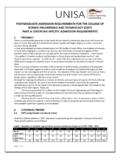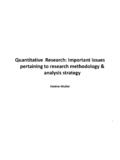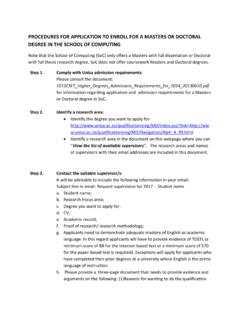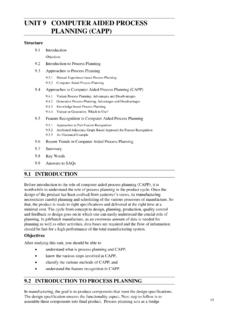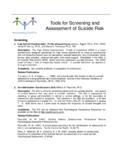Transcription of Towards teaching Computer Ethics - University of South Africa
1 Towards teaching Computer Ethics C de Ridder a L Pretorius b A Barnard c a Unisa, South Africa , b Unisa, South Africa , c Unisa, South Africa , Abstract: With the advent of the Information Age and global connectivity, the ethical use of Information and Communication Technologies (ICT) has become essential. As the drive Towards the establishment of a so-called IT profession gains momentum, ethical conduct and codes of Ethics have recently been formulated and introduced formally. Forerunners in this initiative are the ACM and the IEEE. Of particular significance is the ImpactCS. Project commissioned by the joint taskforce of the ACM and IEEE, and funded by the USA National Science Foundation. The increased globalisation and inherent nature of ICT, transcend physical and cultural borders, making it increasingly difficult to enforce accepted laws, regulations, and codes of conduct. It is thus the responsibility of Computer Science and Information Systems instructors to teach and instill values and Ethics in each and every student.
2 Therefore, we investigate some issues pertaining to the teaching of Computer Ethics . We conclude this paper by presenting a possible model to be used in the teaching of Computer Ethics , and apply this model to our own institution. Keywords: Computer Ethics , curriculum studies, Computer science education Computing Review Categories: , , 1. Introduction Britz [4] who attempts to define Ethics as The terms Ethics , and in particular follows: Computer Ethics (CE), may seem vague and The ethical actions of a person can be not at all important to many Computer described in general terms as those scientists, especially those who hold the view actions which fall within the range of that technologists should deal with technology, those activities that would be regarded as and philosophers with philosophy and Ethics good . It relates thus to the question of [6]. It is therefore perfectly reasonable to what is good and bad in terms of human expect that the teaching of CE may also be actions, considered by some as of little importance.
3 Yet and Baase [2] who simply says: many CS/IS instructors hold a different view, Ethics is the study of what it means to do namely that the teaching of CE to CS/IS the right thing . students is as important as the teaching of These definitions may seem somewhat non- technological topics. In this paper we explore scientific. Surely that which one individual this topic in some detail, in particular what CE may understand under the term good , may is, and why and how it may be taught. differ from that of another individual. The Odhams Dictionary of the English Language We discuss a generic model based on the defines the term good as a merit, a moral ImpactCS proposal that may be used when quality, a virtue, an advantage, benefit, profit. considering the teaching of CE, and then apply However, what appeals to us here is the strong it to our own (distance education) institution. emphasis on actions, and the practical nature In this paper we restrict our attention to the of Ethics .
4 This conforms to Aristotle's ACM/IEEE approach to the teaching of CE. classification of different kinds of science, viz theoretical, productive and practical science [18], with Ethics , politics, and economics 2. Computer Ethics constituting the practical sciences. This is but Many authors [1, 6, 11, 20, 21, 27] who one of the reasons why we consider the discuss the topic of Ethics simply assume that teaching of CE to form an integral part of the their audience is conversant with the notion of training of any IT professional. Again, Baase Ethics . We find it useful to state clearly what [2], supports this by stating that Computer we consider this broad term to imply, and its Ethics involves ethical issues faced by a particular relevance to CE. The literature Computer professional as part of the job . We offers numerous definitions and notions of the therefore describe the term Computer Ethics terms Ethics and Computer Ethics [15], but for (CE), as the study of those behavioural actions the purposes of this discussion we concur with of IT professionals that will benefit all of society.
5 Science curriculum, the subsequent ImpactCS. Project, and the Computing Curricula 2001. (CC2001) for the current iteration of the 3. teaching Computer Ethics : a Computer science curriculum. broader perspective Numerous ethical and social issues caused by The nine core subject areas in CC91 were Computer technology arise. According to algorithms and data structures, architecture, Martin and Yale-Weltz [17] these issues have artificial intelligence and robotics, database three unique characteristics: and information retrieval, human- Computer - new concerns are rapidly emerging, communication, numerical and symbolic - Computer Ethics presents a continuous computations, operating systems, programming stream of new situations, and languages, and software methodology and - computerised information systems are engineering. The recognition of the social, usually complex. ethical and professional context of Computer Ideally students should be equipped with science was included as one of the theories of philosophy and Ethics pertinent to foundational principles, but CC91 fell short of these characteristics, as well as the skills to providing sufficient detail and guidelines for analyse, evaluate, and react appropriately to implementation of CE within the curriculum.
6 Ethical dilemmas which may arise during their careers as IT professionals. Forester and In 1994 the subsequent ImpactCS Project was Morrison [9] identified the following main funded by the US National Research categories (or groupings of topics) in which Foundation to produce a more rigorous these ethical and social concerns usually arise: definition of the content area of Ethics and - Computer crime and Computer security, social impact within Computer science, and a - software theft and intellectual property methodology for integrating these topics across rights, the Computer science curriculum. - Computer hacking and the creation of viruses, In 1998 another major review of curriculum - Computer and information system failure, guidelines for undergraduate programs in - invasion of privacy, computing, Computing Curricula 2001. - social implications of artificial intelligence (CC2001), was undertaken [33]. Fourteen and expert systems, and knowledge areas were identified, including - workplace computerisation.
7 One entitled Social and Professional Issues. CC2001, Draft (February 1, 2001) [33]. It is often within the context of these contains extensive recommendations for all the categories, that the behavioural actions of the knowledge areas except for Social and IT professional impact on society. We believe Professional Issues. This task still remains to this to be one of the main reasons as to why be completed. Since we are of the opinion that CS/IS instructors should sensitise their the introduction of CE into our CS/IS. students, the IT professionals of the future, to programs is a matter of some urgency, we actions that underpin concepts such as good , decided to use the ImpactCS Project moral , ethical , and beneficial for society framework as the present guideline. When the at large. This is in agreement with Searls [24] CC2001 recommendations on CE become who states that the teaching of CE should aim available, we shall study and consider them for Towards several important goals, viz.
8 : incorporation. - increased sensitivity to ethical concerns and situations, as well as 4. Who should teach Computer - reasoning about alternative courses of action and the integrity to make moral Ethics ? decisions. Computer Ethics is by definition a subject that involves multiple disciplines, certainly at least A certain historical perspective is gained by Computer science and philosophy. When recalling three major contributions in the considering the teaching of CE an obvious teaching of Computer science, viz. the question arises: Should it be taught by development of Computing Curricula 1991 philosophers, or should Computer scientists (CC91) by a joint task force of the ACM and take this task upon themselves? the IEEE Computer Society as a framework for the previous iteration of the Computer The vast and growing literature on CE all other fields and that the question under distinguishes between at least two main discussion will simply disappear.
9 Having schools of thought. An argument in favour of established that Computer scientists should be philosophers is based on the view that the responsible for the teaching of CE, we now goals of such a course should determine who focus on the framework for our model, viz. the ought to teach it. According to Johnson [14] knowledge units proposed in [13, 16, and 17]. these goals are: 1) to make students (future computing professionals) aware of the ethical issues 5. The ImpactCS framework surrounding computers, The ImpactCS Project proposes five 2) to sensitise them to ethical issues in the use knowledge units [16, 17] as the basis for CE. of computers, and in the practice of the courseware. These knowledge units and its computing professions, associated topics are: 3) to convey to students a deep understanding of the ways in which computers change Unit 1 - Responsibility of the Computer and impact on society, and Professional 4) to provide conceptual tools and develop ) history, development, and impact of analytic skills for ethical decision making Computer technology, within the computing world.
10 Why be ethical, ) major ethical models, Johnson maintains that, while having to do ) definition of computing as profession, with computers, these goals and issues are at and base ethical, social, and professional, and that: ) codes of Ethics and professional nothing in the training of Computer responsibility for Computer professionals scientists and engineers prepares them for (in [6, 23] the reader is presented with these types of activities.. Philosophers useful information as to the ACM and are specifically trained to analyze issues, IEEE codes of conduct). to uncover the assumptions or implications of arguments and claims, and to develop Unit 2 - Basic elements of ethical analysis arguments. Philosophers trained in ethical ) ethical claims can and should be theory have a repertoire of concepts and discussed rationally, frameworks that are useful for examining ) ethical choices cannot be avoided, and situations, identifying the moral core, and ) easy ethical approaches and solutions evaluating and justifying courses of action are questionable, it is hard.
